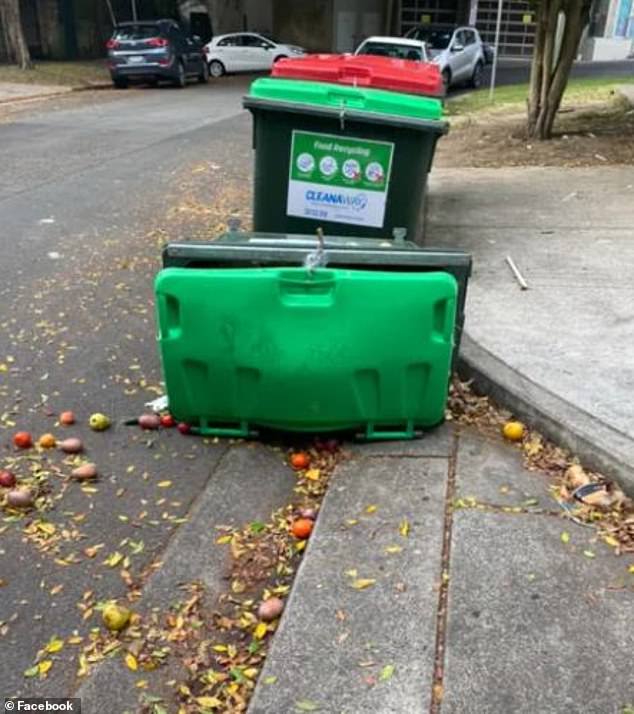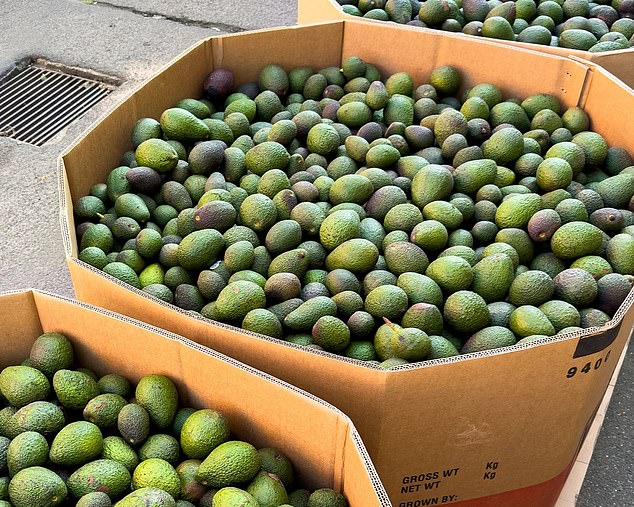A fresh produce ‘rescuer’ has revealed the staggering number of avocados he saved from being dumped in landfill because they were deemed unfit for sale.
Farmers Pick co-founder Josh Ball shared a photo of large bins filled to the brim with fresh produce.
Mr Ball said he intercepts around 4,000kg of avocados each week that go to landfill and blames supermarkets for the waste.
He said many fresh products are thrown away because of small defects and imperfections.
Last month, 1,600kg of avocados from a Queensland farm were dumped in landfill because they had been rejected for superficial reasons.
“The avocados we rescued had a combination of skin blemishes and were irregular in size and shape,” Ball said. Yahoo.
He said other types of fresh produce, including citrus, are also being thrown out due to similar cosmetic problems.
Mr Ball said waste contributes to rising food prices during a cost of living crisis due to supply shortages.
Josh Ball, co-founder of Farmer’s Pick, said it saves around 4,000kg of avocados (pictured) from ending up in landfills every week.
“Customers are already struggling to get fresh fruit and vegetables onto their tables due to rising inflation, and this problem is exacerbated by the shortage of fresh produce,” he said.
‘Also, the price of rejected produce is a hidden factor in the cost of products in stores. So if we ate everything that is produced, fresh food would probably be cheaper.’
Farmers Pick sells discarded fruits and vegetables to customers at a discounted price in several states.
The independent retailer estimates that around 2.4 billion kilograms of produce are rejected each year before the items leave a farm.
Mr Ball urged retailers to take more responsibility for reducing food prices by preventing quality produce from going to waste.
A Coles spokeswoman told Daily Mail Australia that the supermarket works hard to ensure that fresh produce meets customers’ tastes and preferences.
“We offer a variety of avocado sizes to our customers to maximize the use of our farmers’ harvest, including a five-pack and our loose offering,” the spokeswoman said.
‘We evaluate all produce for eating quality, ripeness, pest damage, appearance and expected shelf life, and are deeply committed to balancing our customer-focused fresh produce specifications with minimizing food waste.’
‘A growing number of our customers recognise that great tasting fruit and vegetables come in all shapes and sizes and are increasingly purchasing from our I’m Perfect range.’
A Woolworths spokesperson told the Daily Mail that the supermarket has measures in place to review requirements for fresh fruit and vegetables stocked in stores.
“Our product needs are adaptable and respond to the quantity and availability of fruits and vegetables in the market, which is affected by seasonality, supply and weather,” the spokesperson said.
“This allows us to work with growers to meet customer demand, while reducing food waste from unsold fruit and vegetables in our stores, and avoiding unnecessary food miles and emissions associated with its transportation.”
The spokesman said Woolworth’s Odd Bunch range offers customers imperfect fruit and vegetables at cheaper prices.

Farmer’s Pick estimates that around 2.4 billion kilograms of produce are rejected each year before it leaves a farm (pictured, fresh produce abandoned inside a green bin at the back of a grocery store in Sydney)
Daily Mail Australia has contacted Aldi for comment.
Shocking findings from think tank The Australian Institute have revealed that Australian households waste nearly $20 billion a year by throwing away food.
The report, published last year, showed that major supermarket retailers rake in more than $1 billion because people buy more food than they need.
The report attributes strict cosmetic regulations on the appearance of fruit and vegetables as a cause of product waste.
Food prices have risen by 17 per cent since March 2020, according to ABS figures.
Australians are struggling with the cost of living, with inflation well above the 2 to 3 percent target range.
The consumer price index (CPI) grew by 3.8 per cent in the year to June, still further above the Reserve Bank’s 2 to 3 per cent target.

